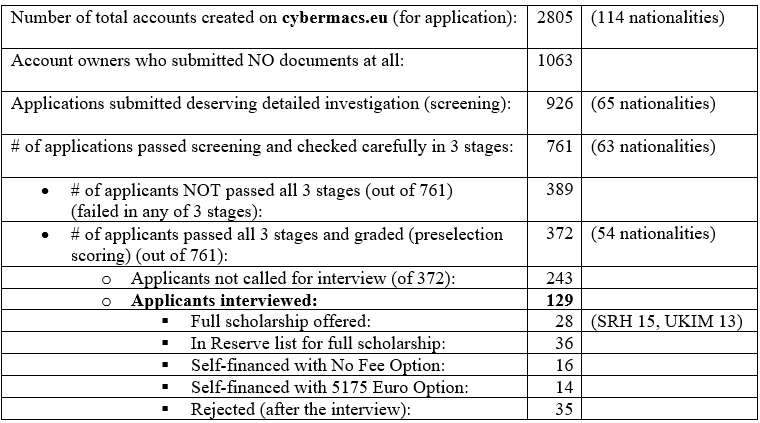A summary of the second Intake for CyberMACS regarding the selection process.
Results for 2024-2025 Student Edition: For the 2024-2025 period, 761 valid applications were received from 63 different countries, and 243 applicants were called for interviews after a careful evaluation process. The diverse and talented cohort from various countries underscores the global reach and impact of the CyberMACS programme. For 2024-2025, the final student intake comprises 32 highly talented individuals, representing a diverse array of countries: Albania (1), American (1), Bangladesh (3), Bolivia (1), Cambodia (2), Cameroon (2), Ecuador (1), Ethiopia (1), India (2), Indonesia (2), Nepal (1), Kazakhstan (1), Kenya (2), Kyrgyzstan (1), Macedonia (1), Montenegro (1), Malawi (1), Malaysia (1), Morocco (1), Nigerian (1), Pakistan (1), Palestine (1), Tanzania (1), Turkish (1), Ugandan (1). The programme embraces gender diversity with a cohort consisting of 16 females and 16 males, highlighting inclusivity in the field of cybersecurity. 28 students have been awarded the prestigious CyberMACS Scholarship, 3 students are enrolled in self-funded, and 1 student is enrolled in the self-funded with 5175 Euros status.

The 3-stage processing and selection includes the following criteria and procedures.
- Screening phase: Applications are first checked for completeness of the documents (11 different documents are required: Certificate, Cover Letter, Curriculum Vitae, Diploma Scan, English Proficiency, High School Diploma, Passport Scan, Publication, Recommendation Letter, Proof of Residence, Transcript). 926 applicants were assessed, and 761 applicants were qualified at this stage.
- Administrative, language, and academic validity checks and Preselection: Applications passing the screening phase are subjected to further and detailed checks: Administrative, language and academic processing (total of 761 applicants from 63 countries worldwide). At the end of this process, 389 applications were put aside with no further processing, while 372 applicants from 54 nationalities were elevated to the detailed academic merit-based processing and ranking level. Two selection committee members evaluate the 372 applicants’ documents separately and assign a grade. The average of both grades is used for ranking.
- Interviews: Depending on the applicant’s ranking, the 10% cap on scholarship holders from a particular country, and the number of students foreseen for admission, the following rules were applied for developing an interview list and conducting the face-to-face (online) interview. A total of 129 applicants out of 372 applicants are interviewed. Every applicant called for an interview by Joint Selection Committee members is first given a 40-minute 60 multiple-choice computer and math basics test. The formation of the interview has the following rules:
- Suppose there are less than six or equal applications from a country. In that case, every applicant passing the administrative, language, and academic merit-based evaluation (those within the 372 applicants) is called for an interview.
- Suppose there are seven or more applications from a country. In that case, the top 5 applicants passing the administrative, language, and academic merit-based evaluation (those within the 372 applicants) are called for an interview.
- At the interview stage, students are evaluated based on their motivation, experience, and ability to integrate into this international program.
- Applicants are then ranked depending on their overall mark, including the mark for merit (34%), mark for the test (33%) and interview (34%). The mark is not changed after the application of the other criteria. Three main ranked lists (full scholarship, non-scholarship, non-scholarship with a 5175-euro programme fee) and one ranked full scholarship reserve list are then drawn up for the second intake.
- The consortium determines the numbers in each list (full scholarship, non-scholarship, non-scholarship with a 5175-euro programme fee) every year.
- Applicants offered a full scholarship are not allowed to change their mobility path; however, applicants offered a self-financed option are given a chance to petition a change of mobility path. The Executive Board evaluates the petition, and a final decision is made.
- In the case of equality with male students, female students are promoted right before male students with the same overall mark.
- Geographical limitations apply then.
- If a student on the full scholarship list should decline the offer or not reply in due time, the next student on the reserved list is offered a place with a scholarship, except if their nationality quota has been reached. If so, the next student on the main list is considered for a scholarship.
